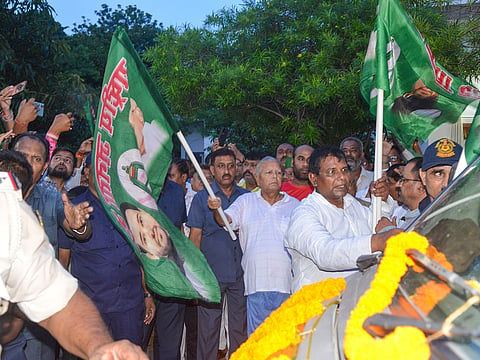Election Commission faces neutrality test in Bihar over mass voter deletions
Stonewalling, missing records, and a flawed review spark ‘vote stealing’ charge

If you believe Rahul Gandhi, leader of the opposition, Thanos from Game of Thrones is a bonafide voter eligible to vote in the Bihar elections. Incredible, but on cursory examination true, as Gandhi shared a Thanos voter ID on social media.
What gives these allegations against the Election Commission (EC) an air of credibility is its absolute stonewalling and refusal to share information. After claiming in writing to the Supreme Court that the Special Intensive Review (SIR) being carried out in Bihar — which has removed an incredible 6.5 million voters from the state’s voter rolls — was implemented after an independent appraisal, respected Right to Information activist Anjali Bhardwaj sought information. The EC simply refused to share any such appraisal.
Can a constitutional body mandated to umpire and conduct elections in the world’s largest democracy simply block all information — or worse, use opaque consultation — to carry out such fundamental and widespread deletions?
Combative press conference
What made it worse was the combative press conference held by Chief Election Commissioner Gyanesh Kumar, who seemed unable to answer reporters’ questions and took to insulting opposition leaders in an unedifying first for a supposedly apolitical official.
Now, with the September 1 deadline of the SIR, the EC has admitted that 30,000 deleted electors in Bihar are desperately seeking inclusion. This leads to the obvious question — also repeatedly asked by the Supreme Court — why was this exercise carried out so close to the actual Bihar elections?
With the EC and the SIR mired in controversy, the opposition’s “vote chori” (stealing votes) campaign is finding huge traction in Bihar. As I keep telling my astute readers of SWAT analysis, the Bihar voter is extremely sharp, political, and aware of voting rights. Nothing riles them up more than the charge of stealing an election. Tejaswi Yadav, Rashtriya Janata Dal leader and former Chief Minister, joined by Rahul Gandhi and Tamil Nadu Chief Minister M.K. Stalin — who addressed each other as “brother” — seem to have caught the voters’ imagination. A BJP campaign to paint Stalin as “anti-Bihar” did not find much resonance.
Opposition relationship
It helps the opposition’s cause that Gandhi and Yadav appear to have worked out an excellent relationship, communicating freely and ironing out differences — unlike the uneasy Gandhi–Banerjee–Pawar equation. Yadav anointed himself the INDIA alliance’s CM candidate, and Gandhi tacitly endorsed this even without a formal seat-sharing arrangement, which the BJP and Chief Minister Nitish Kumar of the Janata Dal (United) had hoped would lead to trouble.
Instead, the Kumar-led alliance is roiling. The BJP is not comfortable projecting Kumar, with his “multiple senior moments,” as the CM face. Gone are the days when he was hailed as an effective administrator who ended Bihar’s “jungle raj.” These days he is derisively called “Kursi Kumar” (allying with anyone for the chair) for his political and ideological flip-flops. Even Yadav, who calls him “Paltu chacha,” barely bothers to mention him in public attacks, sticking instead to the live issue of “vote steal.”
Lacklustre rule
Kumar being irrelevant in a Bihar election campaign would have been unimaginable just a while ago — but that’s politics: harsh, unforgiving, and ruthless. His lacklustre rule has made the BJP extremely uncomfortable. Kumar is now unpopular with voters and is desperately counting on caste equations and the BJP’s incremental upper-caste vote to piggyback into power.
While Bihar is still deeply mired in caste politics, young voters are fed up with the same old narrative. The only thing they want is jobs and a better life, which they see on Instagram reels all day. They are impatient with the lack of infrastructure, education, jobs, and the endemic corruption around them. Yadav is addressing this constituency, promising to change the face of Bihar and usher in prosperity.
It is difficult to promise change while being in power uninterrupted, and Kumar and the BJP face huge anti-incumbency across both state and centre. All the opposition has to say is “Bihar koh kya mila” (what did Bihar get?) — and an angry crowd roars.
Meanwhile, not content with stirring controversy in Bihar, the EC has kicked off the SIR in West Bengal, headed to polls early next year. In border districts of Malda and Murshidabad, voters are rushing to secure birth certificates ahead of the review.
The Election Commission has become a huge factor in both the Bihar and West Bengal polls. Is it by accident or design? The results will tell us whether it helped or hindered the outcome.






